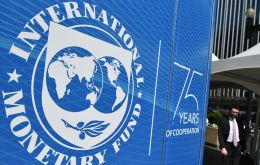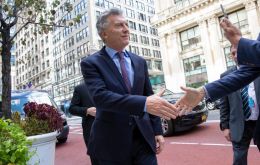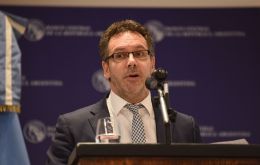MercoPress. South Atlantic News Agency
Tag: International Monetary Fund
-
Wednesday, October 9th 2019 - 09:55 UTC
New IMF chief claims the world economy is in a “synchronized slowdown”

Grinding trade disputes are undermining the global economy, which is set to see its slowest growth in nearly a decade, the new IMF chief said on Tuesday. Research shows the impact of the trade conflict is widespread and countries must be ready to respond in unison with cash infusions, Kristalina Georgieva said in her first speech as managing director of the International Monetary Fund.
-
Thursday, October 3rd 2019 - 09:54 UTC
Developing nations foreign debt reaches US$ 7.8 trillion, World Bank report

Total foreign debt held by developing nations jumped more than 5% to US$7.8 trillion, driven by a surge in Chinese debt, the World Bank said in a report on Wednesday.
-
Thursday, October 3rd 2019 - 08:52 UTC
The IMF after Argentina

By Kenneth Rogoff (*) - It’s high time to ask how to refocus the International Monetary Fund’s mandate for dealing with emerging-market debt crises. How can the IMF be effective in helping countries regain access to private credit markets when any attempt to close unsustainable budget deficits is labeled austerity?
-
Wednesday, September 25th 2019 - 09:54 UTC
Macri holds a 'constructive meeting' with IMF, but no news about the pending tranche of a major loan

Argentine President Mauricio Macri met with his International Monetary Fund backers in New York on Tuesday, but there was little light shed on whether the body was likely to approve a key US$ 5.4 billion tranche of funds to the indebted country.
-
Friday, September 13th 2019 - 11:47 UTC
IMF remains strongly engaged with Argentina; meeting with officials scheduled for later this month

The International Monetary Fund is continuing talks with Argentina as authorities there try to stem spiraling economic problems in Latin America’s third-largest economy, IMF spokesman Gerry Rice told reporters on Thursday.
-
Thursday, September 12th 2019 - 09:55 UTC
Questions on the role of the IMF in the Argentine financial situation

Despite a history of many IMF rescue programs, Argentina once again faces a deepening financial crisis, raising questions about whether the Washington-based lender made a mistake in its dealings with Latin America's third largest economy.
-
Tuesday, September 10th 2019 - 09:54 UTC
Argentine gross public debt stands at US$ 337.367 million; 2020 repayments sum US$ 44.232 million

Argentine gross public debt climbed 3% at the end of the second quarter of the year and has reached US$ 337.367 million compared to US$ 327.166 million in the same period last year, according to the Financial Secretariat.
-
Friday, September 6th 2019 - 09:58 UTC
Alberto Fernandez pledges to honor debts as long as it doesn't harm Argentines

Argentina's likely next president, opposition front-runner Alberto Fernandez, laid out his populist credentials during a visit to Madrid on Thursday, saying local Argentine interests would trump those of creditors and energy investors.
-
Tuesday, September 3rd 2019 - 09:55 UTC
Argentina talking with IMF on monetary targets; Central bank insists the country's financial system is “solid”

Argentina’s central bank is talking to the International Monetary Fund about revising its monetary policy target for September, the institution’s president Guido Sandleris told reporters in Buenos Aires on Monday.
-
Saturday, August 31st 2019 - 17:54 UTC
The “Amazon fires of uncertainty” in Argentina: can they get worse?

Argentina’s battered bonds were driven still lower on Friday after a credit rating cut from Standard & Poor’s triggered automatic selling mechanisms at big pension funds. Risk spreads blew out to levels not seen since 2005 while the local peso currency extended its year-to-date slide to 36%, forcing renewed central bank market intervention and intensifying worries about Argentina’s ability to honor its dollar-denominated debt.
